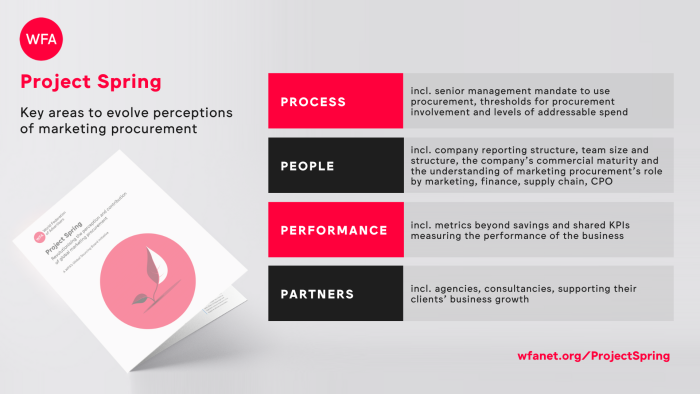Get analysis, insight & opinions from the world's top marketers.
Sign up to our newsletter.
Three WFA Sourcing Board members share on how they are going about positioning marketing procurement as a vector of growth and a valued business partner rather than as a simple driver of savings.
WFA’s Project Spring initiative is an ambitious attempt to create world-class standards for marketing procurement to ultimately change the perception of the function but making that a reality requires everyone to be clear about what exactly they are talking about.
Last year’s report established the fundamental principles of what constitutes great marketing procurement and this year the WFA Sourcing Board is focusing on how we make that common practice in as many companies as possible. We’ve published definitions of some of the most commonly used terms to stop people talking at cross purposes and hosted ‘Ask the Sourcing Board’ sessions focusing on different hot topics within marketing procurement.
“Project Spring is a wonderful reference point and source of truth as well as progression for marketing procurement” – WFA Sourcing Board member
The latest session saw board members share their personal experience and learnings from actioning on Project Spring’s four pillars within their businesses Process, People, Performance and Partners.

A live poll conducted among the participants who took part in the session provided a snapshot of the varied situation across our industry when it comes to enhancing marketing procurement’s position as a valued partner.
Fifty percent said their company’s marketing capabilities program factored in the need to upskill marketing sourcing colleagues, so they have a seat at the table, and one third said procurement and marketing have shared business metrics for the organisation (although an additional 44% said marketing and procurement do share metrics).
We also asked WFA’s Executive Committee how they viewed marketing procurement teams. Half described them as savings generators, 27% said valued (and value creating) partners and 11% said they were agency bullies. The remaining 12% was evenly split between strategic consultants and don’t know.
The panellists shared on how they are ensuring that the four pillars are delivering.

“Since the launch of Project Spring, we have really shifted how we talk about our role and performance across the total value set that the marketing procurement function delivers. Our focus is on driving fuel for growth, which comes in many forms. Of course, cost reduction that can be reinvested into programmes to drive brand growth will always be important.
However, more and more our value in driving excellence in the end-to-end connection of our brands with the best of the industry is directly driving specific performance outcomes of our business, beyond cost. Be that how we work with our agencies to progress our inclusion and diversity goals, or partner to innovate and deliver on our sustainability agenda, marketing procurement’s ‘performance metrics’ are evolving at pace.”

“Project Spring played a key role in helping update the mindset about marketing procurement and, by doing this, enabling us to be recognised as trusted business advisor and to co-author enterprise leadership initiatives.
The relevant benchmarks and data points provided by Project Spring, as well as the open and recurring peer-to-peer benchmarks enabled by WFA, have played a key role in updating the mindset that we have about marketing procurement and as a consequence, also updating the mindset and behaviours our internal stakeholders now have about the function.”

“At L’Oréal, we have been leveraging our partnerships more and have become closer to our ecosystem. Our extended ecosystem means strategic suppliers and also WFA initiatives, NGOs, our marketing sourcing teams around the world and our internal stakeholders. Externally, we have moved from managing partners in one-to-one relationships (advertiser and one supplier) to one-to-many relationships (agencies and other bodies).
We have also changed the nature of our discussions with our partners from Business Performance to share information on a timelier basis, help them in the difficulties they were facing with shorter payment terms and providing them with relevant information.
Internally, we are leveraging more the power of our sourcing network, defining new agile ways of working with our business stakeholders (notably co-creation mode), gathering and analyzing more internal and external benchmarks.
Overall, we have invested more in value and time in our internal and external extended ecosystem. All our actions are done with one obsession: act as value creators and not cost reducers.”
Project Spring is a journey full of promise, not just for our board members, but for all WFA members. It is clear from the data that, while much progress has been made, there is still work to be done in reaching the goal of ensuring sourcing is seen as a strategic partner. There is a collective drive to continue that journey and evolve and transform. Thanks to the guidance of the WFA’s global sourcing board and the collective wisdom of the world’s best sourcing professionals, real change is not far away.

For more information or questions, please contact Laura Forcetti at l.forcetti@wfanet.org